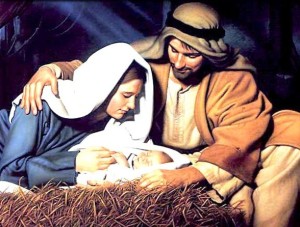Most Bible scholars say no. Consider the portraits related to Jesus’ birth. Do any of the people have coats, hats, or scarfs? Israel is cold in December and temperatures are often below freezing. In 2013 a storm brought Israel 2 feet of snow!
The gospel of Luke provides the clues that on the night of Jesus’ birth sheep were out in the fields (Luke 2:8). Sheep are kept out into the open fields only during warm weather – between Passover in the spring and the rainy season in the fall. Sheep are not in the fields on cold nights in late December.
Luke 1 explains that Jesus was born 6 months after John the Baptist. If we knew when John was born we could determine Jesus’ birth-month. Research points to John being born in the spring, probably in late March. This is derived from Luke 1 that tells of John’s father, Zacharias, who was a priest of the division of Abijah (Luke 1:5). Each priest division served in the temple for one week at a time. According to 1 Chronicles 24:10, the division of Abijah served the 8th rotation week. The Hebrew calendar indicates this division would be on duty in early June.
An angel appeared to Zacharias during his rotation and told him his wife Elizabeth would have a son and to name him John; for he will prepare the people for the Lord in the spirit and power of Elijah (Luke 1:17). Zacharias went home after his rotation and Elizabeth conceived a child, likely in late June.
In the 6th month of Elizabeth’s pregnancy (December), Mary is visited by the angel Gabriel, who tells her she will conceive a child who is the Son of God. Mary goes with haste to stay with Elizabeth who says blessed is the fruit of your womb (Luke 1:42), indicating Mary was also pregnant in December.
Mary stayed for 3 months and then left. John was born shortly thereafter (late March). Six months later Jesus was born; most likely in late September around the Jewish New Year (Feast of Trumpets, Day of Atonement, and Feast of Tabernacles).
Luke establishes a timeline by adding that Caesar Augustus issued a decree for all residents of the kingdom to be registered in the city of their ancestors. This would be an unpopular request; so to make it more palatable, it likely occurred during a festival time when people planned to travel. The most likely time for this event would be the festivals in September, which would explain why the city was crowded with visitors.
If Jesus was born in September, why has Christmas been celebrated on December 25th since the 4th century? This is most likely due to the celebration of the pagan sun god (Sol Invictus). This date was considered the birthday of the unconquered sun after the winter solstice. This celebration followed the Roman Saturnalia festival that involved feasting and exchanging gifts. Some historians say this date was chosen for Christmas to ease tensions between the pagans and Christians. This confusion is another example of how Satan deceives us from the truth and attempts to steal glory from God.
The writings of the New Testament, which span 4 generations after Jesus’ birth, do not mention any celebrations of Christmas. Thus, our bottom line should be to worship God and thank him for sending us His Son, no matter what day He was born. What really counts is His sacrificial death for our sins and the resurrection to come.
For more information, go to Church of the Great God:
http://www.cgg.org/index.cfm/fuseaction/Library.sr/CT/ARTB/k/568


Thank you, I’ve just been searching for info about this topic for a while and yours is the best I have came upon till now.
Your web place is valuable for me. Thanks!…
Excellent post